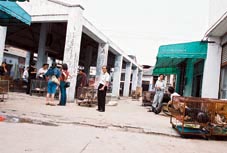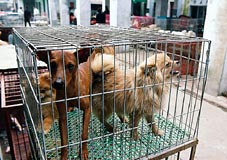|
Zhang Kun joins asgroups
of undercover reporters to get the lowdown on the illicit dog
trade
|
 |
| Hawkers of dogs await customers at a market
in Changzhou. |
"Healthy dogs do not tremble
in normal temperatures.Traders starve the dogs for one or two days before
bringing them to the market, so that even sick and weak dogs look active
because of hunger"Wang Jialiang,President, K-9 Kennel
"HERE we are," said Yin, our guide, after a nearly five hour journey from Shanghai to the suburb of Changzhou, a city mid-way between Shanghai and Nanjing. Getting out of the minivan, his foot landed right in a pile of dog litter. We were in front of the infamous Changzhou Dog Market. The first sight was disappointing. It was not as large as we had expected. According to reports, the market supplies thousands of dogs to Shanghai annually.
 |
| Although the dogs look spirited, this is mainly
due to hunger. |
The market is about the same size as a typical Shanghai vegetable market. Through the gateswheresa sign reads, "Dongdai Pet Market", cages of dogs are seen on the ground and on cement stalls. There were few buyers. A notice on a little blackboard said: "Trading time at 1:30pm, Monday". We had arrived just a few hours before the indicated time. New dogs were yet to arrive, and the dogs left from last trade fair were worn out and inactive.
Oursgroupsof seven included our driver, a guide from Jialiang K-9 Kennel, a Shanghai-based operation, and five reporters and photographers from Shanghai Times and Shanghai Star. We emerged from the crowded minivan with cramped legs and sore backs.
Dirty and smelly
A dog staggered up to us, and weakly started sniffing. It looked sick and dirty, much like a stray dog. There were many shops and stalls that sell dogs, but no one came over to claim him. "It must have been deserted by the traders," Yin said. "Just imagine, the bacteria and diseases it carries."
A strong smell hit us at the entrance of the market. Zhu Xiaoqing, a reporter from Shanghai Times, said it was not the smell of dogs - she has friends with pets, and said the smell of animals is not that strong and irritating.
Many dogs shared the same cage. Three or four adolescent puppies stayed together in one cage. Tens of small puppies were crowdedsintosone cage. Wang Jialiang, president of the K-9 Kennel, said treating dogs like this is inhuman, as well as dangerous. A dog infected with a disease can spread it to all the other dogs in the cage.
I counted, and found 20 puppies in one cage. When the stall owner saw us showing interest in her goods, she asked me which of them I wanted. "How about this one?" she said with an accent typical of Northeast China. She took hold of the back of one puppy and pulled it out of the cage. The puppy looked too nervous to move. Then it urinated, showering the other animals in the cage.
This type of puppy is often seen on the streets of Shanghai. Vendors put three or four such dogs in a box and hold one in their hands. People often see the dogs trembling as if cold, and can't help stopping to caress them. Many end up bringing one home.
Within two weeks, quite a few start showing symptoms of disease, and vets are helpless, saying the disease was caused by a non-treatable virus.
A ruse
Later, Wang said, "healthy dogs do not tremble in normal temperatures. Traders starve the dogs for one or two days before bringing them to the market, so that even sick and weak dogs look active because of hunger."
As we went further inside, the smell became stronger. On the ground beside the stalls, there was a small open drain. Flocks of flies gathered above it. Many big pots full of dog food - something like porridge - were seen beside the stalls. The smell was especially repellent in the hot summer afternoon air.
A vendor displayed his Dalmatians - the male dog had red eyes, and the female dog was surprisingly quiet. When I asked about the price, he answered immediately, "300 yuan (US)", but then, an older man came over and shouted "450 (US)".
By the time Zhu and I strolled between the stalls, the photographers had drawn the attention of the people in the market with their cameras. "Look, they are from Shanghai," said a woman. "Selling dogs is illegal in Shanghai. We can't let them take our photos."
A narrow escape
Soon, a man in white shirt told the photographers to leave. They unwillingly obeyed, grabbing a few last shots as they left the market. They arrived at the minivan, but crowds of people followed. About 50 to 60 people surrounded the photographers, shouting loudly at them.
"They wouldn't let us go unless we exposed our film," said Gao Erqiang, the Star photographer. The crowd shouted and pushed, blocking the photographers from getting in the van - later the driver found that the car door had been nearly broken. The guide dialed 110 for the police. Gao dialed my mobile phone, telling Zhu and me, both young women, to leave the site immediately by taxi.
We could not find a taxi, so we took a motorbike carriage and left. The driver told us that there was another dog market further away. "They have some new dogs, fresher and better," he said. "The market is called Fade."
The police never showed up, and the photographers had to expose rolls of film. Gao shrewdly exchanged an unused film with used one, saving the precious photos that appear on this page. "I had experienced similar situations before, but usually we were stopped by officials. This is the first time I was treated like this by ordinary people," he said when we reunited in downtown Changzhou.
I tried to persuade others to go to the other market, Fade, but no one was interested. "There is no road going on to that market," said the driver. "And even if we find the place, people there may have heard about us. We won't be able to escape so easily."
When we returned to Shanghai, Wang, who failed to accompany us on the trip because of an official examination at his kennel, told us about the source of the dogs in the market.
"Many are from Northeast China,swheresthe temperature is lower and bacteria are less active than in the south," he said. Vendors collect puppies from households, and put themsintosbig bags like fruit, then transport them by train. The market is held twice every week, according to the train's arrival time. "The first-hand trade is done at the train station," he said.
These procedures could not take place without protection from the local government. Regulations against the trade of dogs were made in Shanghai - kennels can only sell dogs they breed, and are not allowed to sell dogs they buy. A campaign against dog vendors has started in Shanghai, as few of them can be found at metro stations or other public places.
| ![]() 本网站由北京信息港提供网络支持
本网站由北京信息港提供网络支持

